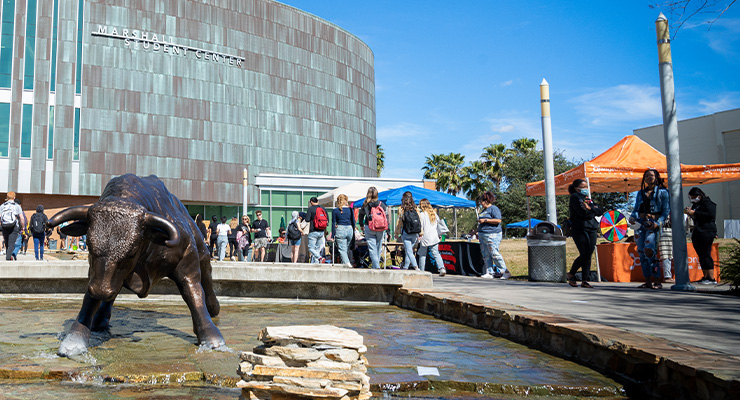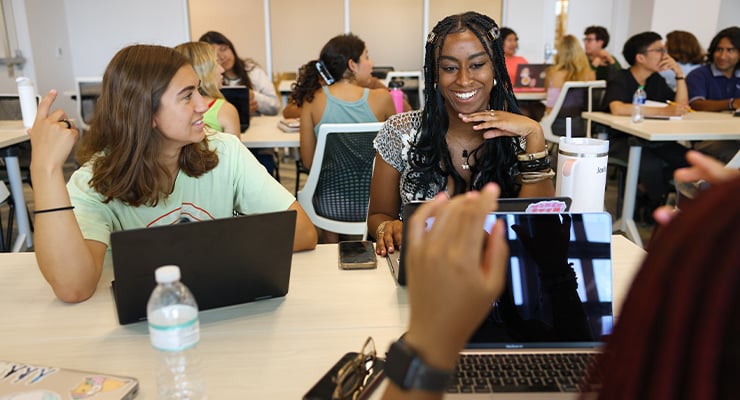The Importance of Finding Your College Fit
By Rachel Swearingen | Last Updated: Mar 5, 2025

Watch any teen drama set in high school and eventually, you’ll see the characters wrestling with the choices they have to make after graduation. Whether it’s Nathan Scott in One Tree Hill going to play basketball in college or Devi Vishwakumar in Never Have I Ever obsessing over attending Princeton, we can all relate to that sense of uncertainty and not knowing what the future has in store after graduation.
Choosing to attend college is one thing, but what do you do when deciding which college to attend? The college you attend won’t just help you earn a degree or jumpstart a career. It’s the place you’ll learn, grow, and make friendships to last a lifetime. It’s the place you should be proud of once you’ve graduated, a place you can humbly brag about when talking to others.
But finding that perfect fit means you’ll have a lot of factors to consider – let’s look at how you can find your ideal university and why that choice is so important.
Factor #1: Are the Academics Right for You?
So, first and foremost, make sure the universities you’re looking at offer the right academic programs. Examine these options for all schools, whether it’s your reach school, match school, or safety school so you know what’s available.
What Majors Do They Offer?
Let’s say you spent your high school career learning French and you’ve discovered a passion for it. If the college you’re considering doesn’t offer French as a major, that might not be the place for you. Check each university’s list of majors to ensure they’re offering something you want to do, or if you don’t know what you want, see if they offer exploratory programs. At USF, we have a few exploratory program pathways that college freshmen can take to learn more about business, science, math, and more.
What’s the Coursework Like?
You also need to ensure you can handle the coursework. If you’re planning to attend an institution known for rigorous courses, but you aren’t a competitive person, you could end up feeling very stressed. In the same vein, a competitive student may struggle at a college that doesn’t offer a challenging curriculum. Check each university’s student profile to get a good idea of the students that attend that school. For example, at USF in 2023, the average ACT score among incoming freshmen was 27-31.
What Other Programs Are Provided?
Finally, determine what other programs you’ll need to succeed in college. Do you perform better knowing you have access to peer support or tutoring services? How extensive is the school library? Ask your admissions recruiter at each school to tell you about the academic support or career services they provide.
Many schools also provide a study abroad program, which can enrich your academic experience immensely. Imagine taking your French expertise and studying while sitting on a bench near the Seine River or collaborating with other students in Marseilles.
Do You Require Accommodations?
If you’re a student who needs accommodations, research those as well. Make sure your school can help you with anything you need during your academic journey. Yes, colleges will work with students who need accommodations, but some may do it better than others. Reach out to each college’s student disability service office to see what your options are. 
Factor #2: Location, Location, Location
Ask any real estate agent and they’ll tell you that location is vital when buying property. Well, in your case, location is important when choosing a college. Would you be happy at a university in the middle of Texas? Or would you prefer a school closer to the beach?
Maybe you want to stick close to home, or maybe you want to be far away from home. Whatever the underlying factors are, you need to choose a school with a location that’s going to make you happy.
Also, consider the career opportunities near your school. If you’re choosing a smaller school in a smaller city, you may not have too many options to wield that French degree. However, a larger university in a bustling metropolis likely offers more chances for you to practice your linguistic passions.
Factor #3: Look at the Size of Your Schools
Did you go to a smaller high school and love it because everyone knew your name? Or conversely, did you dislike everyone knowing your name? Think about that as you plan your college choices. Even schools like USF have different options. The Tampa campus is the largest one, with several thousand students. At the St. Petersburg campus, you get a smaller university setting, and at the Sarasota-Manatee campus, it’s a tight-knit community.
Think about what sort of setting would make you happiest. Larger schools will offer more access to more student organizations and more people to meet, while a smaller school gives you more of a community feeling. If you get anxious thinking about a larger school, then a smaller one might be a better fit for you.
Factor #4: Let’s Talk About Money
There’s no point in beating around the bush on this one. College is expensive. You know it, and we know it. However, that expense varies greatly based on the type of school you’re choosing. For example, say you live in Florida. If you opt to attend a public in-state university, you’ll pay less in tuition.
Going out of state or to a private university means a larger tuition bill – and more student loans that you’ll need to take out and eventually repay. It’s up to you to determine if it’s worth it to go to a private school and have loans for longer, or whether a public university with more affordable options is better for you in the long term.
Some colleges also have more scholarship opportunities that you can take advantage of, which can be a huge deciding factor. Check with your school choices to see what options they have so you know what you might be able to apply for.
Factor #5: What Is the Campus Culture Like?
You’re probably thinking, “But how can I tell what campus culture is like just from looking online?” You can pore over YouTube, social media, and other sources to find examples from university students – but the best way by far is to schedule a campus tour where you can experience the college for yourself.
Once you’re there, observe the students and ask questions about on-campus organizations. Your admissions recruiter may also set up a time for you to talk with current students or alumni about the university, and that’s a great time to ask about culture. You may find that there’s a living-learning community that you can join, or a chance to get involved with student government.
Another big part of campus culture is university athletics. If sports are important to you, then look to see what sports they offer on campus. At USF, we have more than 20 men’s and women’s varsity teams – and very recently, our men’s basketball team just had an amazing record-breaking season. 
Factor #6: Will You Be Set for Career Success?
Examine the opportunities each school on your list will offer when it comes to career services and support. Do they have a career services program? Or do they have partnerships set up with local organizations for internships? If they do have a career services department, then find out what those services are. Most college career programs will offer services like:
- Interview practice
- Resume writing workshops/assistance
- Networking events
- Business clothing closets
- Internship opportunities
Want to know more about whether your college choice affects your career? Learn more here.
Why Choosing the Right College Is Important
College can be a fun time, but it can also be stressful. It’s vital to research and compare and contrast each of your choices. Picking the wrong school could have negative effects on your mental health, which is something you need to think about before leaping into a big decision. Finding the right place that will help you thrive and develop the skills you need for success is a big undertaking.
Take the time to process your college choices. Try talking to friends, family, or other people in your life like your high school counselor or your teachers. If you’re unsure about anything related to your college choices during the application or admissions process, there will be people there to help. At USF, our admissions recruiters are always standing by to answer your questions. Contact admissions@usf.edu any time you have a question!


